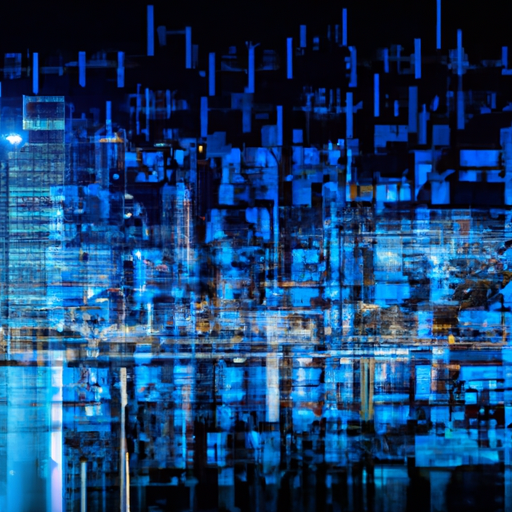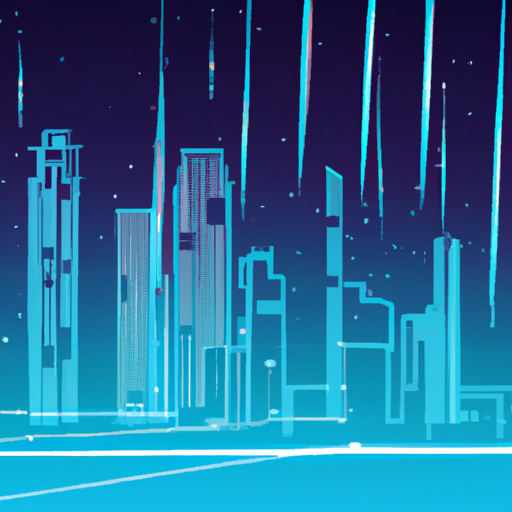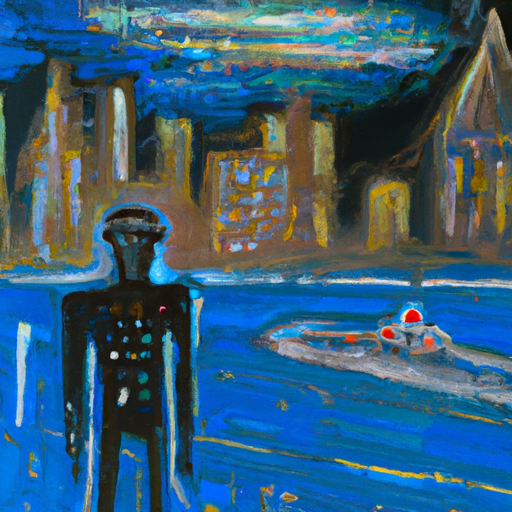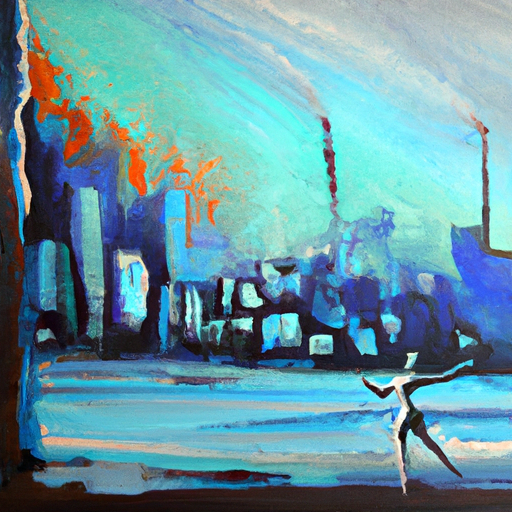Smart cities, powered by AI and advanced analytics, dazzle with traffic, energy, and service optimisation. Yet, they cast shadows of privacy issues, potential tech failures, and job threats due to automation. It's our job to keep the dream alive while tackling the dystopian downsides.
Welcome, dear reader, to the digital dance of the future – a tango between humans and smart cities. This high-tech ballet is as intriguing as it is perplexing, as promising as it is perplexing. So, hunker down and prepare to be unceremoniously thrust into an exploration of the sultry love affair between Homo Sapiens and AI-driven metropolises.
In this digital drama, is humanity the star or just an extra? Are we basking in the glow of a high-tech haven or teetering on the precipice of a digital dystopia? As we pirouette through the pros and peculiarities of living in a smart city, we'll try to answer these questions without tripping over our own shoelaces.
And finally, like a skilled fencer, we'll parry with the double-edged sword of human life in such cities – a thrilling duel between the blessings and curses of this brave new world. So, dear reader, put on your virtual reality goggles, grab a bucket of popcorn, and let's dive into the heart of the smart city schematic.
- 1. "Smart Cities: A High-Tech Haven or a Digital Dystopia for Humankind?"
- 2. "Living in a Smart City: The Pros and the Peculiarities"
- 3. "The Double-Edged Sword of Human Life in AI-Driven Metropolises"
1. "Smart Cities: A High-Tech Haven or a Digital Dystopia for Humankind?"

Welcome to the digital garden party, my friends, where the grass is greener, the air is cleaner, and the buildings are, well, smarter. Let's stroll down the lane of this high-tech haven, the smart city. But tread cautiously, for our lane may lead to a digital dystopia.
On the one hand, smart cities twinkle with the promise of a utopian future. They're like a friendly neighborhood robot, always ready to lend a hand in managing traffic, reducing pollution, saving energy, and providing public services. Think of it as Big Brother, but in a non-creepy, eco-friendly way.
These urban utopias, powered by AI and advanced analytics, can predict and respond to the needs of their citizens in real time. Traffic jam at Main Street? The AI traffic controller diverts vehicles, un-knotting the congestion before you can say "rush hour". Power shortage in the East End? No worries, the smart grid redistributes electricity, ensuring your Netflix binge remains uninterrupted.
But, just like a thriller with a plot twist, our journey through this intelligent infrastructure brings us to a crossroads. While smart cities promise a life more comfortable, they also pose questions about privacy and security. In a city where every trash can, street light, and parking spot is part of an interconnected web of devices, how safe is your personal data?
And then, there's the AI divide to consider. In a smart city, your daily life relies heavily on being digitally connected. But what about those who can't afford the latest smartphone or don't have access to stable internet? The risk of creating a digital underclass, left behind in the race to the future, is real.
So, my friends, as we stand at the intersection of innovation and caution, we must ask ourselves: Are smart cities the high-tech haven we dream of, or could they morph into a digital dystopia? It seems the answer lies in our hands, or perhaps, in our smart devices.
2. "Living in a Smart City: The Pros and the Peculiarities"

Living in a Smart City: The Pros and the Peculiarities
Tap-dancing with technology, we find ourselves pirouetting into the futuristic world of smart cities. It’s like living in a sci-fi novel, but without the aliens (unless you count your Alexa!). So, grab your cup of data-driven joe and let's sift through the pros and peculiarities of this digital urban utopia.
Firstly, the Pros. Smart cities are like an overzealous personal assistant, constantly striving to make your life a tad bit more comfortable. You're late for work? No worries, your self-driving car has already calculated the fastest route, dodging traffic like a ninja. City services become more efficient, as big data and AI predict and manage urban needs in real-time. Energy consumption is optimized, waste management is streamlined and public safety is enhanced. The digital connectivity fosters a shared economy, encouraging services like Uber and Airbnb. In this neon-lit, data-driven cityscape, convenience is king!
Now, let's switch gears to the Peculiarities. The smart city, although shiny and efficient, has a more serious side we must address. It's the proverbial Pandora's Box of privacy concerns. As we saunter down the streets, we are constantly generating data, leaving digital breadcrumbs that can be gathered, analyzed, and potentially misused. In this city, Big Brother isn’t just watching, he’s taking copious notes!
Additionally, while the technology dances to the tune of efficiency, it also hums the melody of inequality. Not everyone is techno-literate and those unable to keep up with the digital pace may find themselves sidelined. The city runs on the fuel of data and those without access to this fuel may find themselves left in the digital dust.
The smart city, like an AI-powered, data-driven, omniscient genie, grants us the convenience and efficiency we yearn for, but it also leaves us grappling with the peculiarities of privacy and digital divide. A blessing or a curse? Well, it seems we're waltzing with both.
3. "The Double-Edged Sword of Human Life in AI-Driven Metropolises"

Picture this: Bob lives in a city where the traffic lights have a sixth sense. They turn green the moment Bob approaches them, making his commute faster and less stressful. The streetlights dim when he's not around, conserving energy. Garbage cans send a tweet to the local waste management agency when they're full. Are these the chronicles of Bob in some sci-fi utopia? Not quite! Welcome to the era of smart cities, where AI and advanced analytics are the new urban sheriffs.
Now, let's talk about the double-edged sword of human life in these AI-driven metropolises.
On the shiny edge of this sword, we have a basket of blessings. AI and advanced analytics weave together information from a vast array of sensors and data points across a city, optimizing resources, reducing waste, and making lives like Bob's more comfortable. It's like having a proactive, invisible butler, always one step ahead, smoothing out potential wrinkles in your day.
Think of the potential health benefits. AI can predict public health issues, from forewarning about possible disease outbreaks to identifying areas with high air pollution levels. A smart city can monitor the elderly or disabled, alerting medical services if they fall or need assistance.
Now, flip the sword, and you’ll see the somewhat murkier side. The first concern is privacy. With sensors tracking your every movement, the city knows more about you than your diary. That's a lot of personal data potentially up for grabs, and it's not just the city officials who could be interested.
Then, there's the issue of over-reliance on technology. What happens when the technology fails or, worse still, gets hacked? An AI glitch could mean Bob's stuck in traffic for hours, or the streetlights go rogue, turning the city into an inadvertent disco.
Lastly, while AI and automation can improve efficiency, they also threaten jobs. From traffic wardens to waste management workers, smart city technology could make many roles redundant.
So, are smart cities a blessing or a curse? Well, like Bob's traffic lights, they're a bit of both. The future of AI-driven metropolises holds great promise, but it also comes with its fair share of challenges. It's up to us to ensure the balance tips more towards blessing than curse. Stay tuned, folks!
So, there you have it, folks! As we traverse the techno-laden roads of smart cities, it's clear we're not in Kansas anymore. These high-tech havens offer a smorgasbord of benefits – convenience, efficiency, and a jetpack boost to sustainability. Yet, they also come with their own set of peculiarities. Privacy becomes as elusive as a cat at bath time, and the digital divide might just turn into the Grand Canyon. It's indeed a double-edged sword, sharper than a sushi chef's knife. Are smart cities a blessing or a curse? The jury's still out on that one. Ultimately, as we dance to the rhythm of AI-driven metropolises, it's crucial to strike the right balance – ensuring we reap the benefits without losing our human touch. Because in the end, we're not just inhabitants of these smart cities, we're the heart and soul that keeps them alive.
